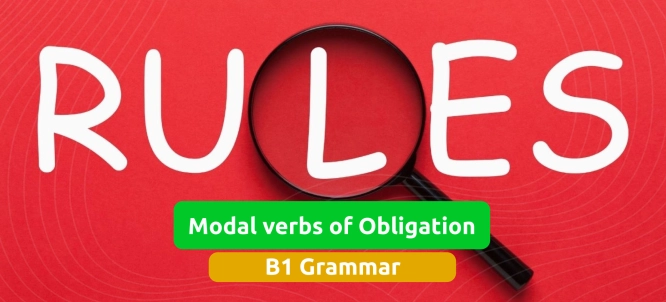by PushtoLearn
Modal verbs of Obligation
Table of Contents
Modal verbs of Obligation Exercises
These exercises focus on Modal verbs of Obligation
What Are Modal Verbs of Obligation?
Modal verbs of obligation show what is necessary, required, or advisable to do. The three main modal verbs of obligation are:
-
Must – for strong obligation or necessity.
Example: You must wear a helmet when riding a bike. -
Have to – also for obligation, often external.
Example: I have to go to work at 9 a.m. -
Should – for advice or mild obligation.
Example: You should drink more water.

Rules for Using Modal Verbs of Obligation
1. Must
-
Used to show a strong internal or external obligation.
-
Often used for rules or laws.
Structure:
Subject + must + base verb
Example: You must stop at a red light.
2. Have to
-
Similar to must but is used for external requirements (e.g., work, school rules).
-
In the past tense, use had to.
Structure:
Subject + have to + base verb
Example: I have to finish my homework by 8 p.m.
Example (past): Yesterday, I had to visit the doctor.
3. Should
-
We use should to give advice or a recommendation.
-
It’s not as strong as must or have to.
Structure:
Subject + should + base verb
Example: You should apologize if you make a mistake.
To learn more about Modal Verbs including Past Modal Verbs, have a look at these lessons: Modal verbs of Prohibition, Modal Verbs of Deduction, Modal verbs of Permission, Modal verbs of Necessity.
Common Errors
|
Common Error |
Correct Usage |
|
You must to study for the test. |
You must study for the test. |
|
I have finish my project tomorrow. |
I have to finish my project tomorrow. |
|
She should goes to the doctor. |
She should go to the doctor. |
Everyday Use of Modal Verbs of Obligation
Here are some everyday examples:
-
At work
-
Employees must wear an ID badge.
-
You have to complete the report by Friday.
-
At home
-
I have to clean my room before guests arrive.
-
You should take out the trash.
-
Health and safety
-
You must fasten your seatbelt in a car.
-
You should exercise regularly to stay fit.
Key Differences Between Must, Have to, and Should
|
Modal Verb |
Strength of Obligation |
Examples |
|
Must |
Strong (rules, laws) |
You must not smoke in this building. |
|
Have to |
Strong (external requirement) |
I have to wake up early for work tomorrow. |
|
Should |
Weak (advice, suggestion) |
You should try the new restaurant in town. |
FAQ on Modal Verbs of Obligation
What is the difference between must and have to?
Must is often used for rules or personal feelings of obligation, while have to refers to external requirements like work or school rules.
Can I use must in the past tense?
No, use had to instead for past obligations. Example: I had to call my teacher yesterday.
Is should a strong obligation?
No, should is used for advice or suggestions, not strong obligations.
What’s the negative form of must?
The negative is must not (or mustn’t), meaning something is prohibited. Example: You must not park here.
Can have to and must be used interchangeably?
Sometimes, but have to is more common in casual speech, while must is often used for formal rules or emphasis.

